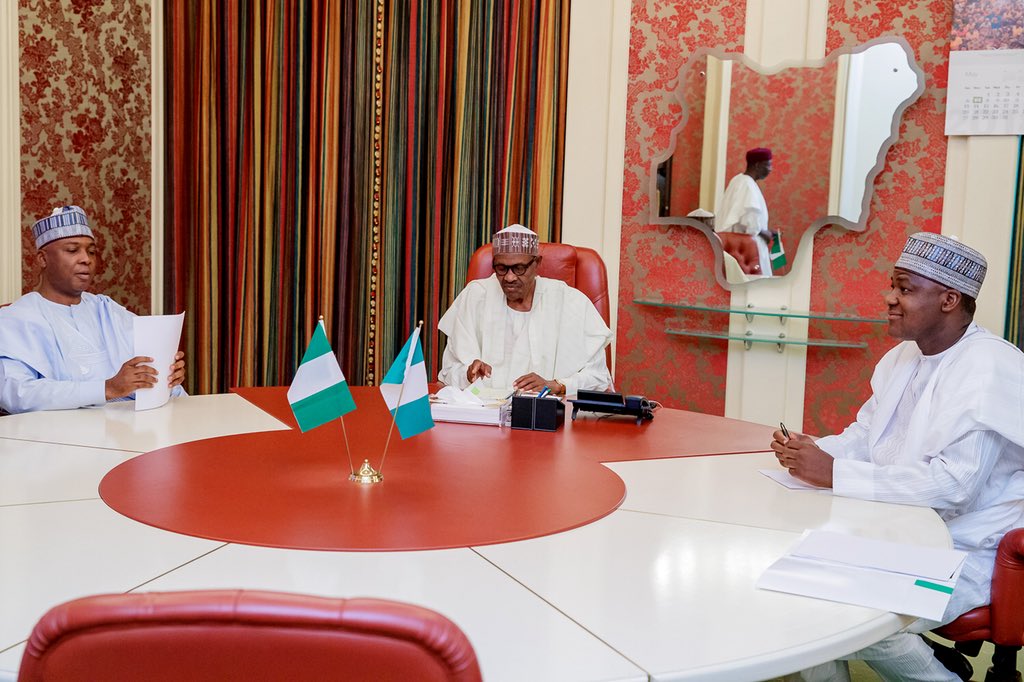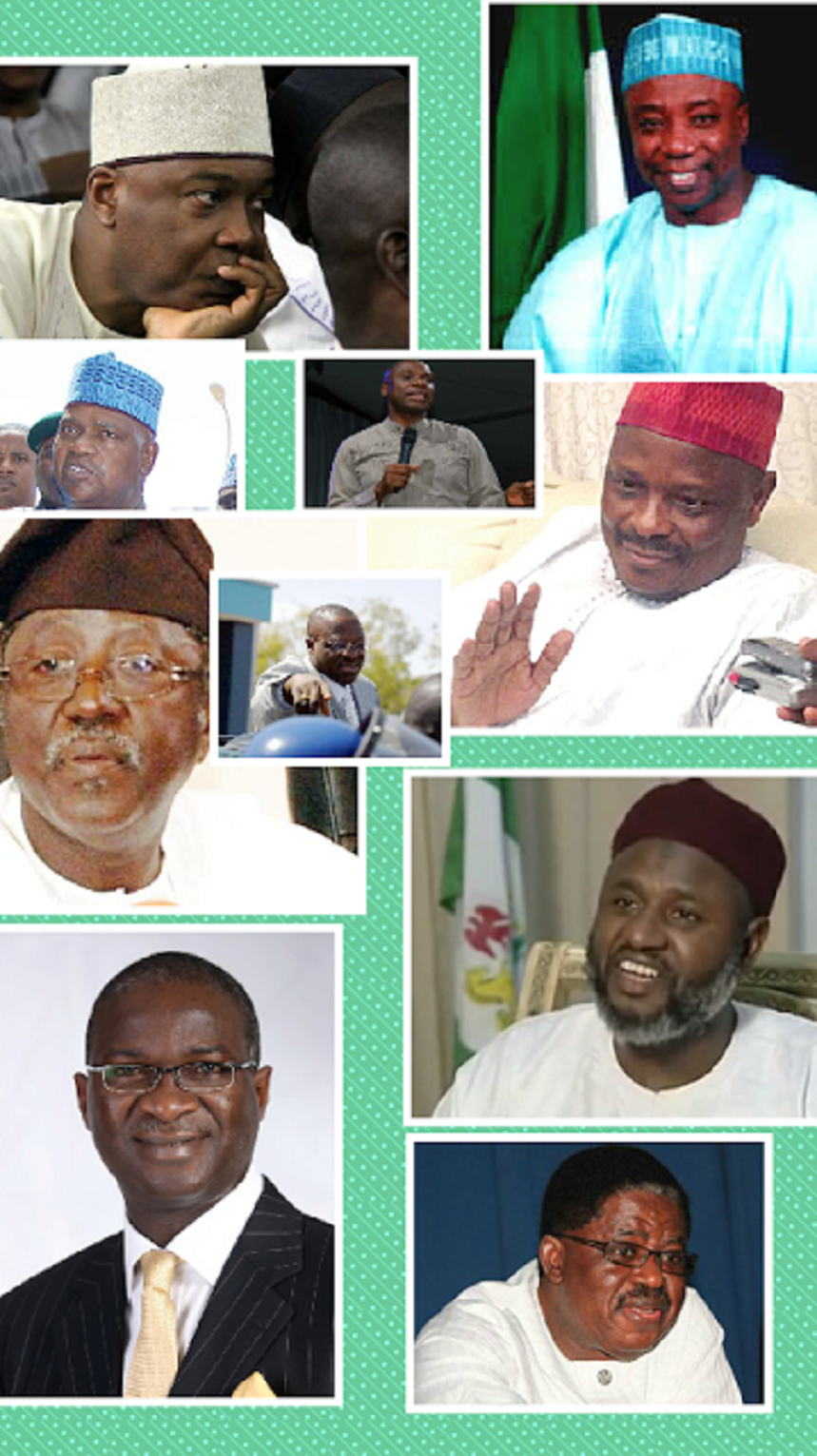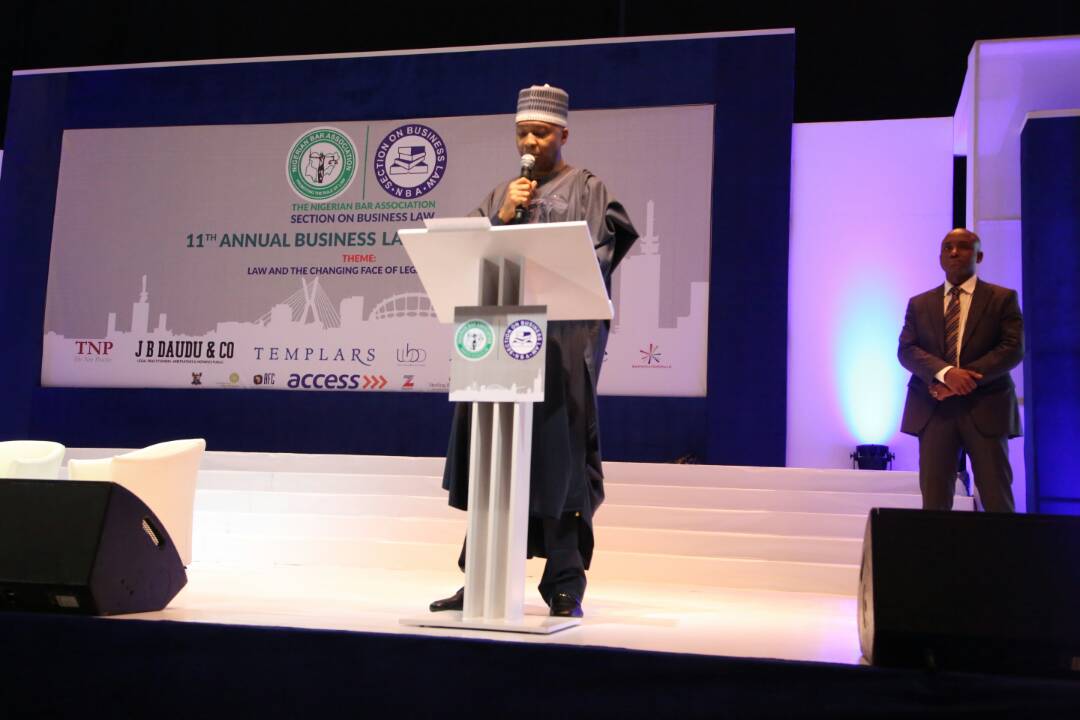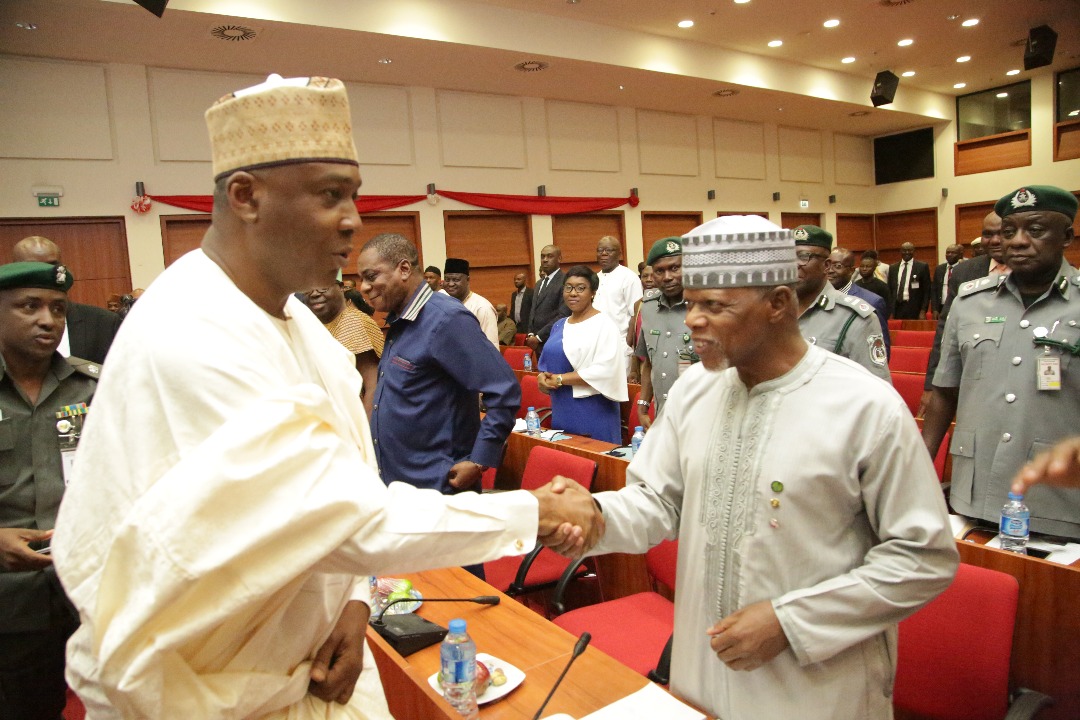Feature/OPED
The Saraki Led Senate: A Midterm Assessment
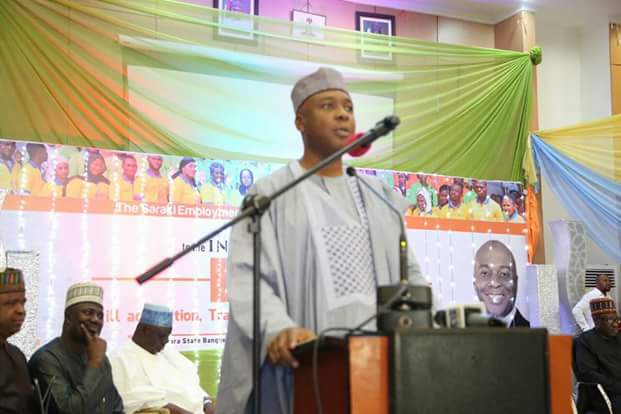
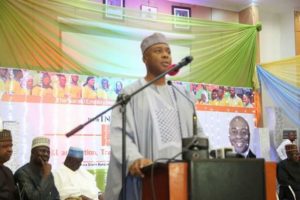
By Omoshola Deji
The Nigerian legislative arm of government, comprising the Senate and the House of Representatives, is rarely in the good books of the public. No congregation of legislators in Nigeria has arguably suffered public condemnation like the 8th Senate. Some learned figures and media commentators at a point moved beyond reproach to demand the scrap of the Senate. They question the significance of debated bills, the running costs of bicameralism, the motives behind oversight functions and brand legislative summons as vendetta. Right on time, this trending doubt on the necessity and the credibility of the Senate amplifies the need for an assessment of its accomplishments and shortcomings.
The Nigerian Senate is largely a gathering of prominent, but inefficient persons. Majority of the legislators are ex-occupiers of vital public positions, but virtually none of them has a distinct record of public service. The Senate seems to be the most preferred retiring ground for power-addicted ex-governors, ex-military officers, ex-party chairmen, political juggernauts, industrialists and the stupendously wealthy. Aside that these bigwigs have done almost nothing to better the lot of the have-nots in their communities, not to mention constituency, most of them are enmeshed in controversies, scandals and allegations of monumental corruption.
The Senate President is standing trial for false asset declaration at the Code of Conduct Tribunal. Change is indeed here! A foremost figure of the ruling party and chief lawmaker is facing the law. Apparently, Saraki’s ordeal is twisted in twists. Only a member of the ruling inner caucus can affirm whether Saraki prosecution is genuinely based on alleged infractions or he is being persecuted for orchestrating a political coup against his party to emerge Senate President. Either ways, Saraki’s integrity to hold public office has been badly tainted; he is broadly considered a symbol of corruption.
Undeterred, Saraki has resolutely fought to remain the Senate president. The unalloyed support of a substantial number of the senators remains his shield and armor. The pro-Saraki senators have ruthlessly relegated their anti-Saraki counterparts to benchwarmer. Since the presidency is unwilling to smokescreen corrupt conducts, the pro-Saraki senators have played a no-friend no-foe game in the discharge of their oversight duties. They swiftly draw attention to the flaws of the Presidency and publicize investigation findings.
One of such findings that remains a key accomplishment of the Senate is that of her committee on the Mounting Humanitarian Crisis in the North East. The Shehu Sani led committee unraveled the alleged corrupt practices of Babachir Lawal, the suspended Secretary to the Government of the Federation (SGF). Babachir was indicted of awarding N233million invasive-plant-species (grass) clearing contract to firms he has strong stakes in. Presenting a temporary report at plenary, Shehu Sani throw up mindboggling evidences that Babachir received kickbacks of over N200 million into the account of Rholavision Nigeria Limited – a firm he co-founded and remains an account signatory. Upon concluding the investigation, Sani lamented during plenary that Babachir actually misappropriated over N500 million. Impenitently, Babachir’s arrogance and pronouncement that the senators are “talking balderdash” triggered the Senate’s determination that justice must take its course. Their persistence largely led to the suspension and ongoing investigation of Babachir.
Anyone proclaiming there’s nothing good about the Senate is merely tendering a malicious criticism. The 8th Senate just passed the first out of the three-part Petroleum Industry Bill. The Senate is worth commending for passing a 17year old bill that outlived the 5th, 6th and 7th Senate. Aside that, the Senate has shown commitment towards ensuring transparency and equality in the operations of government agencies. The Senate has mandated its committee to investigate the lopsided DSS recruitment that mainly favored some northern states. Instead of the allocated five slot per state, 51 persons were recruited from Katsina, the home state of President Buhari and the DSS Director-General, Lawal Daura.
It could also be recalled that the Senate compelled the Customs Comptroller General, Hameed Ali, to stay action on the plan to collect import duties from vehicle users across the country. Worth commending, you and I would have been paying for customs inefficiency, if the Senate didn’t condemn Ali’s obnoxious policy. Nonetheless, customs officers are using the policy to extort the public without authorization. The Senate is also challenging the electricity distribution companies over high electricity tariffs and inefficient service delivery. Efforts are being made to ensure metering determines actual consumption. When this is fully effected, the astronomical monthly billing termed ‘cost reflective tariff’ would be abolished.
On financial issues, it would be flattery to label the senators prudent, but their rejection of Buhari’s request to borrow $29.960 billion abroad is worthy of applaud. Although the loan is supposedly meant to finance the provision of key infrastructures across the country, it is ludicrous to borrow for infrastructures that cannot generate enough funds to repay the debt. Besides, Buhari’s health challenges would have paved way for his aides to squander and embezzle a significant portion of the loan. If not for the resistance of the Senate, our unborn generation would have been plunged into slavery. The burden of the soft-looking, but hard to fulfill loan conditions would force them to follow the dependency economic dictates of the western nations. Not again! Nigeria is yet to recover from the afflictions of Ibrahim Babangida’s Structural Adjustment Program (SAP).
Startlingly, the senators shielding Nigeria from the bondage of foreign loans are enchaining Nigerians with their insatiable greed and unscrupulousness. They earn humongous salary and allowances to deprive the masses comfort. Their prodigal pay is nearly 200 times the nation’s GDP per capita and 10,000 times the minimum wage. While many Nigerians sleep hungry, the legislatures allotted themselves a whopping N13 billion for refreshment, travels and welfare in the 2017 budget. Still not contended, they corruptly enrich themselves via constituency project allocations and budget padding. Sadly, the amenities in their constituencies are either dilapidated, unmanaged or non-existing. In a time of recession when the price of commodities has doubled, the Senate’s budget increased while the minimum wage remains unchanged.
Resigning to fate cannot bring us change! If relentless protest can force the legislators to publish their hidden budget, then we all must remonstrate till the senator’s lack of conscience seize to fuel our inconvenience. Despite been sufficiently remunerated, most of the senators don’t attend sittings regularly. Many just attend as observers – nothing to contribute. In fact, the contributions of the vocal lawmakers are often below what is expected of a senator. Unfortunately, the below-average intelligence quotient of most of the senators affects the thinking of the chamber and the quality of motions presented.
Be that as it may, the Senate has protected democracy by condemning coup intents and embracing electoral reforms. The lawmakers ensured no state is denied representation by compelling the Independent National Electoral Commission (INEC) to conclude the legislative elections in Rivers state. A day after the senators threatened to suspend sittings till every state is properly represented, INEC swiftly scheduled dates for the conclusion of virtually all non-concluded elections. While the senators must be commended for entrenching democracy, they have ceased to walk the talk.
The same cabal of senators that condemned Rivers de-representation are currently denying Borno South representation via the suspension of Ali Ndume – an estranged ally of Saraki. Ndume bagged a six month suspension for bringing unproved allegations of certificate forgery against Dino Melaye and the avenging of seized bulletproof Range Rover against Saraki. Despite pleas from the Borno state governor, elders and traditional rulers, the Senate has refused to lift Ndume’s suspension. Evidently, the suspension of Ndume is to wholly dissipate the mutinous moves of the anti-Saraki senators.
The Saraki cabal has also proven to be proficient in facilitating the rejection of any bill or nomination they interpret as a threat to their interest. This made many predict the rejection of Ibrahim Magu as the chairman of the Economic and Financial Crimes Commission (EFCC). Magu’s rejection is a tale of many tails. President Muhammadu Buhari (PMB) crushed Magu by allowing him act for too long. Unfortunately, the DSS – an agency under PMB – helped the Senate nail Magu by submitting and resubmitting damning reports against him. To be candid, the Senate would have ridiculed itself if Magu was confirmed the EFCC chairman with such an indicting report.
Even if the DSS had cleared Magu, the rejection or confirmation of nominations is absolutely the discretion of the Senate. No law says anyone presented to the Senate must be confirmed. Nevertheless, it was quite obvious that the senators used their constitutional power to avert the imminent imprisonment of their corrupt colleagues. In truth, most individuals castigating the senators wouldn’t have scored a ruinous own-goal in such circumstance.
Nigerians insistence on Magu shows our level of retrograde. In a nation of over 150million population, it is depressing to see people fuming as if all that is needed to end corruption is Magu. In an ideal world, a hundred of better Magu should be readily available to replace a rejected Magu. Sadly, Nigeria has been – and still prefers to be – building strong individuals rather than building strong institutions.
The Senate is as guilty as the Presidency. Deliberations on the passage of the 2017 budget ceased upon Senator Dajuma Goje’s outburst that police raid his home and confiscated budget documents. In a show of legislative infamy, the Senate backed Goje by insisting that budget scrutiny can’t proceed until the police release his belongings. What a strategic way of blackmailing the police! Are other members of the Appropriation Committee not having copies of the documents in Goje’s possession? Could the institutional arrangements in the Senate be so weak that Goje-is-budget and budget-is-Goje? Apparently, shielding Goje from criminal investigation appears more important to Saraki than national welfare.
Dilemma is when the undesirable becomes the unavoidable. The executive and the ruling party are ostensibly not comfortable with Saraki, but the Senate he leads is pivotal to the success of this administration. The presidency and the legislature must work together on policies that can move Nigeria forward. Any am-not-wanted feeling will further make Saraki a friendly serpent. In plain sight, the commendable efforts of the Senate has been largely misinterpreted or unappreciated due to a public perception that the legislators are not progressives.
Nevertheless, the senators are always anti-people whenever their interest collides with public interest. Saraki is helpless in this regard. He must align with the majority, else he would be uprooted. It is obvious Saraki cannot afford to lose. He would rather associate with any available protective force than face mutiny or conviction at the Code of Conduct Tribunal. If he loses in court, unlike Obasanjo, his own episode would be from power to prison.
Omoshola Deji is a political and public affairs analyst. He wrote in via mo******@***oo.com
Feature/OPED
Revived Argungu International Fishing Festival Shines as Access Bank Backs Culture, Tourism Growth

The successful hosting of the 2026 Argungu International Fishing Festival has spotlighted the growing impact of strategic public-private partnerships, with Access Bank and Kebbi State jointly reinforcing efforts to promote cultural heritage, tourism development, and local economic growth following the globally attended celebration in Argungu.
At the grand finale, Special Guest of Honour, Mr Bola Tinubu, praised the festival’s enduring national significance, describing it as a powerful expression of unity, resilience, and peaceful coexistence.
“This festival represents a remarkable history and remains a powerful symbol of unity, resilience, and peaceful coexistence among Nigerians. It reflects the richness of our culture, the strength of our traditions, and the opportunities that lie in harnessing our natural resources for national development. The organisation, security arrangements, and outlook demonstrate what is possible when leadership is purposeful and inclusive.”
State authorities noted that renewed institutional backing has strengthened the festival’s global appeal and positioned it once again as a major tourism and cultural platform capable of attracting international visitors and investors.
“Argungu has always been an iconic international event that drew visitors from across the world. With renewed partnerships and stronger institutional support, we are confident it will return to that global stage and expand opportunities for our people through tourism, culture, and enterprise.”
Speaking on behalf of Access Bank, Executive Director, Commercial Banking Division, Hadiza Ambursa, emphasised the institution’s long-standing commitment to supporting initiatives that preserve heritage and create economic opportunities.
“We actively support cultural development through initiatives like this festival and collaborations such as our partnership with the National Theatre to promote Nigerian arts and heritage. Across states, especially within the public sector space where we do quite a lot, we work with governments on priorities that matter to them. Tourism holds enormous potential, and while we have supported several hotels with expansion financing, we remain open to working with partners interested in developing the sector further.”
Reports from the News Agency of Nigeria indicated that more than 50,000 fishermen entered the historic Matan Fada River during the competition. The overall winner, Abubakar Usman from Maiyama Local Government Area, secured victory with a 59-kilogram catch, earning vehicles donated by Sokoto State and a cash prize. Other top contestants from Argungu and Jega also received vehicles, motorcycles and monetary rewards, including sponsorship support from WACOT Rice Limited.
Recognised by UNESCO as an Intangible Cultural Heritage of Humanity, the festival blends traditional fishing contests with boat regattas, durbar processions, performances, and international competitions, drawing visitors from across Nigeria and beyond.
With the 2026 edition concluded successfully, stakeholders say the strengthened collaboration between government and private-sector partners signals a renewed era for Argungu as a flagship cultural tourism destination capable of driving inclusive growth, preserving tradition, and projecting Nigeria’s heritage on the world stage.
Feature/OPED
$214Bn Missing, Institutions Silent: Is Accountability Dead in Nigeria?

By Blaise Udunze
Between 2010 and 2026, a staggering $214 billion, approximately N300 trillion in public funds, has been reported as missing, unaccounted for, diverted, unrecovered, irregularly spent, or trapped in non-transparent fiscal structures across Nigeria’s public institutions.
That figure is not speculative but a conservative estimate of unaccounted funds. It is drawn from audit reports, legislative probes, civil society litigation, executive directives, and investigative findings spanning more than a decade. If it is to go by the accurate figure, the true national loss is likely higher but difficult to quantify precisely due to data gaps, overlapping figures, and incomplete audits.
The challenge is that in many of the most prominent cases, prosecutions have stalled, hearings have dragged without resolution, investigations have gone cold, and no defining jail terms have etched accountability into Nigeria’s institutional memory. The irony is that the number is historic, the silence is louder. And the economic damage is cumulative.
The pattern stretches from the oil sector to social investment programmes, from the Nigeria Central Bank of Nigeria (CBN) interventions to ministry-level expenditures. In 2014, between $10.8 billion and $20 billion in unremitted oil revenues linked to the Nigerian National Petroleum Corporation triggered national outrage. Under the then CBN governor, Lamido Sanusi, who warned that persistent oil revenue leakages were making exchange rate stability “extremely difficult.” He cautioned that without full remittances, the alternative would be currency devaluation and financial instability. This concern spans the 2010 to 2013 oil revenue period. That warning proved prophetic.
This is because, years later, the lack of transparency in the oil industry did not disappear, but rather it festered like cancer. It further led to the elongated audit queries, which have continued to trail the Nigerian National Petroleum Company Limited, including unremitted revenues, questioned deductions, and management fee structures under the Petroleum Industry Act. With an extraordinary move aimed at blocking revenue leakages at source, President Bola Ahmed Tinubu has recently issued an Executive Order suspending certain deductions and directing direct remittance of taxes, royalties, and profit oil into the Federation Account, which involves the reassessment of NNPC’s 30 per cent management fee and 30 per cent frontier exploration deduction under the Petroleum Industry Act.
Such presidential intervention underscores the scale of concern, which means that Nigeria cannot afford a structural lack of transparency in its most strategic revenue sector. But oil is only one chapter.
The Central Bank of Nigeria has faced some of the most far-reaching audit alarms in recent years. In suit number FHC/ABJ/CS/250/2026, the Socio-Economic Rights and Accountability Project (SERAP) is asking the Federal High Court to compel the CBN to account for N3 trillion in allegedly missing or diverted public funds. The Auditor-General’s 2025 report cited failures to remit over N1.44 trillion in operating surplus to the Consolidated Revenue Fund, over N629 billion paid to “unknown beneficiaries” under the Anchor Borrowers’ Programme, and more than N784 billion in overdue, unrecovered intervention loans.
There were also N125 billion in questioned intervention expenditures, irregular contract variations exceeding N9 billion, and procurement gaps running into hundreds of billions. The Auditor-General repeatedly recommended recovery and remittance. No date has been fixed for the hearing. Meanwhile, Nigeria continues to borrow.
Elsewhere, the House of Representatives has launched a probe into over N30 billion recovered during investigations into the National Social Investment Programme Agency (NSIPA). The funds, reportedly frozen during investigation, have not been remitted back into the Treasury Single Account, stalling poverty-alleviation schemes like TraderMoni and FarmerMoni. Millions of vulnerable Nigerians remain exposed while lawmakers search for money already “recovered.” The irony is staggering as funds are found, but programmes remain frozen.
A top discovery recently that put the nation on red alert was made by the Senate committee, which claimed to have found N210 trillion in financial irregularities in NNPC accounts between 2017 and 2023, including unaccounted receivables and accrued expenses. A critical concern is that, as of early 2026, this has sparked commentary but no clear prosecutions.
Only recently, in the power sector, SERAP has urged the President to probe alleged missing or unaccounted N128 billion at the Federal Ministry of Power and the Nigerian Bulk Electricity Trading Plc. Of concern is that despite the enormous funds channelled in this sector, Nigeria’s chronic electricity instability persists, even as billions meant to stabilise the grid face audit scrutiny.
Across MDAs, audit reports between 2017 and 2022 flagged trillions in unsupported expenditures, unremitted taxes, unauthorised payments, and statutory liabilities never recovered. These sums are dizzying and are also alarming; N300 billion here, N149 billion there, N3.403 trillion across agencies, N30 trillion-plus Treasury discrepancies raised at the Senate level.
Individually, they shock. Collectively, they define a structural pattern. And patterns shape economies.
Nigeria operates with structural fiscal deficits and also lives with them routinely and comfortably. Expenditure persistently exceeds revenue. When public funds disappear, fail to be remitted, or are trapped outside constitutional channels, the deficit widens. The government must borrow to fill gaps created not only by low revenue, but by revenue leakage.
Debt servicing now consumes a disproportionate share of federal revenue. Borrowing meant for capital projects increasingly finances recurrent obligations. The country shifts from borrowing to build to borrowing to survive. Every missing naira compounds tomorrow’s liability.
The Treasury Single Account (TSA) was designed to plug such leakages. It consolidated government revenues under Section 80 of the Constitution into a unified framework. International financial institutions commended it as a landmark reform. Yet even today, the Minister of Finance, Wale Edun, has admitted that substantial government funds remain outside the TSA and outside the CBN’s consolidated visibility. Until August 1, 2024, he revealed, the federal government could not fully see its own balance sheet at the apex bank. That admission should alarm any serious economy.
Fiscal lack of transparency constrains planning. It undermines monetary coordination. It weakens debt sustainability projections. It distorts policy responses. And when systems are in flux, money vanishes more easily.
Changing or weakening the TSA in such an environment would be catastrophic. Transitions create windows of vulnerability. Old accounts close. New accounts open. Reconciliation’s lag. Ghost contractors reappear. Double payments slip through.
Albeit, the government must learn to tread with caution as Nigeria’s institutional bandwidth is already strained by simultaneous tax reforms, exchange-rate adjustments, subsidy removal, and fiscal restructuring. One truth that cannot be argued is that layering additional structural upheaval onto fragile systems risks revenue loss that the country cannot afford. Investors are watching.
Credit markets evaluate not just numbers but institutional consistency. A nation that abandons or weakens its most credible fiscal reform sends a destabilising signal. Stability lowers borrowing costs. Institutional drift raises them. But beyond markets lies the human cost.
N300 trillion represents roads not built, power plants not completed, irrigation systems not funded, schools not modernised, and hospitals not equipped. It represents jobs not created and industries not catalysed. It represents stalled productivity and deferred growth.
When intervention loans remain unrecovered, agricultural output suffers. When power sector funds are unaccounted for, electricity remains unstable. When social investment funds are frozen, poverty deepens.
Inflation then compounds the pain. Revenue gaps push borrowing. Borrowing pressures, interest rates and by extension, liquidity misalignment fuel price instability. Citizens pay through higher food costs, transport fares, and rent. The poor pay first. The middle class erodes quietly.
Perhaps most corrosive is the trust deficit. When audit queries fade without visible accountability, tax morale weakens. Compliance declines. Cynicism hardens. A nation cannot modernise where trust in fiscal integrity is fragile.
Section 15(5) of the Constitution requires the abolition of corrupt practices. Financial Regulations mandate a surcharge and referral to anti-corruption agencies where public officers fail to account for funds. The Fiscal Responsibility Act empowers citizens to enforce compliance to ensure that government officials follow fiscal rules. But enforcement defines seriousness.
Nigeria’s problem is not a lack of audit findings. It is the distance between findings and finality.
Nations do not collapse overnight due to a lack of funds. They drift. Infrastructure decays incrementally. Debt rises gradually. Growth slows subtly. Confidence erodes quietly. Then one day, stagnation feels permanent. $214 billion (N300 trillion), sixteen years of recurring audit alarms. Few conclusive accountability outcomes are proportionate to the scale. Truly, the consequences have been less strong. For the same reason, the country witnessed President Tinubu nominating ex-NIA boss Ayodele Oke as ambassador despite a $43 million loot in an Ikoyi apartment.
See the research breakdown of some of the audit figures that reveal staggering sums as enumerated above:
– $10.8 billion and separately $20 billion in unaccounted oil revenues at the NNPC in 2014
– $1.1 billion controversial Malabu Oil and Gas oil deal in 2015
– $2.2 billion arms procurement irregularities in 2015
– N3.4 billion from IMF COVID-19 financing flagged in a 2020 audit.
– N149.36 billion, N37.2 billion, and multiple irregular MDA expenditures in 2020 alone.
– N300 billion cited in public audit concerns in 2017.
– N210 trillion in financial irregularities uncovered, N103 trillion in ‘accrued expenses’, and another N107 trillion in unaccounted ‘receivables’ (2017 -2023).
– N57 billion Ministry of Humanitarian Affairs – (2021)
– N3 trillion and N1.44 trillion flagged in 2022 audit issues involving the Central Bank of Nigeria.
– Nearly N630 billion under the Anchor Borrowers Programme is reportedly unrecovered.
– N784 billion in overdue intervention loans flagged.
– Over N3.403 trillion unaccounted for across federal MDAs between 2019 and 2021.
– Roughly 30 trillion+ in Treasury Single Account and Consolidated Revenue Fund discrepancies raised at the Senate level.
– N500 billion in unremitted oil revenues between 2019 and 2024.
– N80 billion tied to alleged fictitious contracts in the Accountant-General’s office.
– N69.9 billion in uncollected statutory tax liabilities.
– Billions more in unauthorised or undocumented expenditures across ministries.
The institutions differ. The years differ. The audit language differs. The pattern does not.
Nigeria’s economic future will not be determined solely by how much oil it produces, how many reforms it announces, or how many executive orders it signs. It will be determined by whether every naira earned enters the Federation Account transparently, whether every intervention loan is tracked and recovered, whether every surplus is remitted constitutionally, and whether every diversion carries consequences. Revenue generation matters. Revenue protection is destiny. Because when government funds go missing, nations do not stand still. They move backwards.
Blaise, a journalist and PR professional, writes from Lagos and can be reached via: bl***********@***il.com
Feature/OPED
The Hidden Workforce of the 2026 Access Bank Lagos City Marathon

When the final runner crossed the finish line at the 11th edition of the Access Bank Lagos City Marathon (ABLCM), the applause began to fade. But for hundreds of workers across Lagos, the real work was just beginning.
Major highways had been closed to facilitate the event. Tens of thousands of runners moved through the city in a coordinated surge of athletic endurance. Thousands of bottles of water and energy drinks were distributed, alongside sachets containing essential medical supplies and medication. The race route itself was meticulously prepared, lined with banners, barricades, medical tents and precision timing systems that ensured safety, organisation and accurate performance tracking from start to finish.
What followed was the part that a few cameras lingered on, yet it remains one of the clearest indicators of institutional progress.
Within minutes of the race conclusion, coordinated sanitation teams fanned out across the marathon corridor. Their work went beyond sweeping. Waste was systematically sorted. Plastic bottles were separated from general refuse. Sachets were gathered in bulk. Collection trucks moved along predefined routes, ensuring rapid evacuation of waste. Temporary race infrastructure was dismantled with quiet precision.
In a megacity like Lagos, speed is a necessity. Urban momentum cannot pause for long. The ability to restore order quickly after an event of this magnitude reflects operational discipline across interconnected systems, municipal authorities, environmental agencies, private waste management partners and event coordinators.
Globally, large-scale sporting events are no longer evaluated solely by participation numbers or prize purses. Sustainability has emerged as a defining metric. Environmental responsiveness is now a core measure of credibility. Cities seeking tourism growth, foreign investment and international partnerships must demonstrate that scale does not compromise responsibility. The 2026 marathon provided a compelling case study in this evolution.
The clean-up operation itself generated meaningful economic activity. Temporary employment opportunities emerged for sanitation workers and logistics personnel. Recycling partners engaged in material recovery, reinforcing circular economy value chains. What was once viewed as routine waste disposal has evolved into a structured ecosystem of environmental services, a sector of increasing importance in modern urban economies.
This level of sustainability was the result of deliberate planning. Effective post-event recovery requires route mapping, waste volume projections, coordination between sponsors such as Access Bank Plc and municipal bodies, contingency planning for congestion points and clear communication protocols.
Each edition of the marathon has built on lessons from the last. International participation has expanded. Accreditation standards have strengthened. Media visibility has grown. Most importantly, environmental management has become embedded in the marathon’s operational framework rather than treated as an afterthought.
Progress rarely arrives in dramatic leaps, it advances through incremental improvements, refined systems and institutional learning. Just as elite runners close performance gaps through disciplined training, cities strengthen their global standing through consistent operational excellence.
The 2026 marathon, therefore, tells a story that extends far beyond athletic achievement. It is a story of coordination, sustainability as strategy rather than slogan, and the often unseen workforce, sanitation workers, planners, volunteers, security officials and environmental partners, whose discipline sustains the spectacle.
Because in the end, global cities are judged by how well they host and how responsibly they restore. On the marathon day in Lagos, it was the runners who demonstrated endurance and the systems, and the people behind them, who ensured that when the cheering stopped, the city kept moving.
-

 Feature/OPED6 years ago
Feature/OPED6 years agoDavos was Different this year
-
Travel/Tourism10 years ago
Lagos Seals Western Lodge Hotel In Ikorodu
-

 Showbiz3 years ago
Showbiz3 years agoEstranged Lover Releases Videos of Empress Njamah Bathing
-

 Banking8 years ago
Banking8 years agoSort Codes of GTBank Branches in Nigeria
-

 Economy3 years ago
Economy3 years agoSubsidy Removal: CNG at N130 Per Litre Cheaper Than Petrol—IPMAN
-

 Banking3 years ago
Banking3 years agoSort Codes of UBA Branches in Nigeria
-

 Banking3 years ago
Banking3 years agoFirst Bank Announces Planned Downtime
-

 Sports3 years ago
Sports3 years agoHighest Paid Nigerian Footballer – How Much Do Nigerian Footballers Earn


